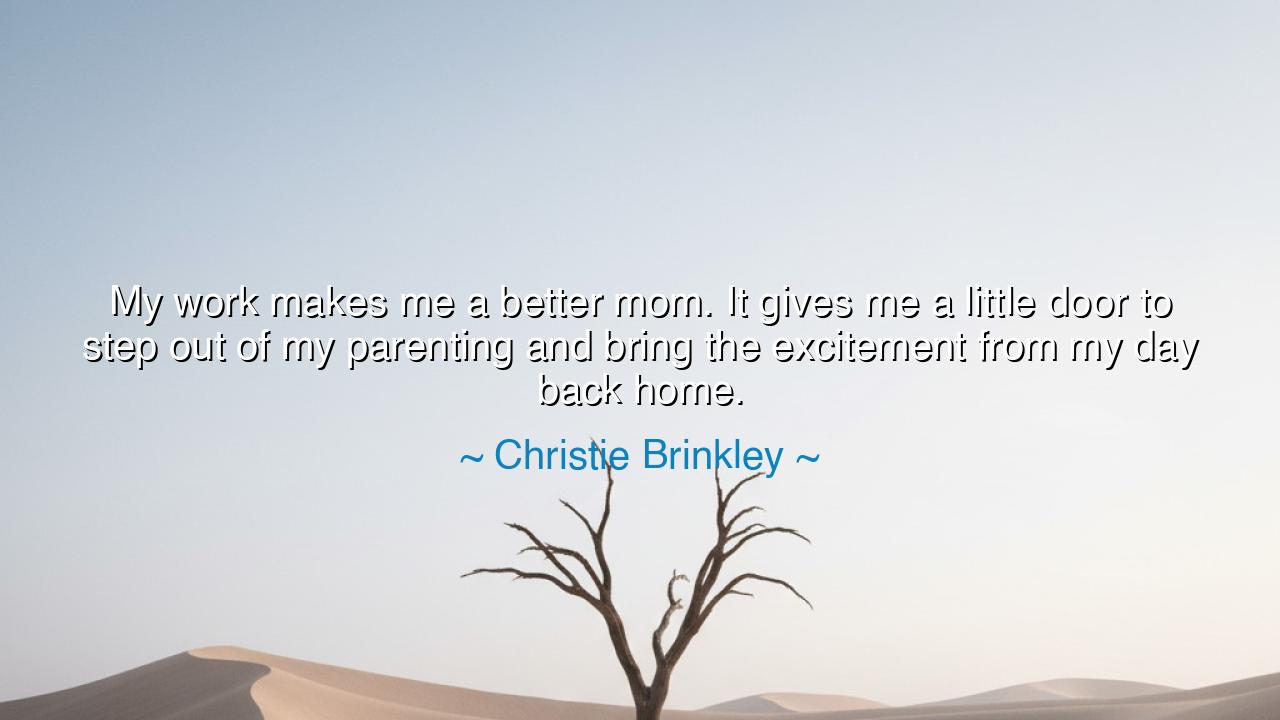
My work makes me a better mom. It gives me a little door to step
My work makes me a better mom. It gives me a little door to step out of my parenting and bring the excitement from my day back home.






When Christie Brinkley declared: “My work makes me a better mom. It gives me a little door to step out of my parenting and bring the excitement from my day back home,” she spoke of a truth that resonates with parents across time — that to give to one’s children with joy, one must also nourish the self. Her words reveal that work and parenting are not always rivals, as some might believe, but companions: one enriching the other, one feeding the spirit so that the other may flourish.
The origin of this wisdom is as old as humanity. In ancient villages, mothers and fathers alike tilled fields, wove cloth, traded goods, or practiced crafts. Their labors outside the home were not distractions from their children, but sources of stories, pride, and provision. The children grew not only on bread but on the example of parents who lived fully in the world. Brinkley echoes this ancient rhythm: to step out through the “little door” of work and return with renewed energy is to bring back more than wages — it is to bring back vitality, perspective, and joy.
Consider the story of Penelope, wife of Odysseus, who for twenty long years kept her home while her husband wandered. She wove and unwove her tapestry not only as a defense against suitors, but as a way of preserving her own dignity and purpose. Her labor gave her strength, and that strength kept her household intact. Like Brinkley, she found that purposeful work could sustain the heart of a mother, making her more steadfast in the care of her child.
The heart of Brinkley’s words lies in balance. Too often, society tells mothers that they must choose: be wholly devoted to the home or wholly devoted to career. But her insight is that the two can complement one another. Work becomes a kind of renewal, a space where the parent reclaims individuality and creativity. And when she returns, she does not come empty, but full — full of stories, of experiences, of a sense of self that enlivens her children. The child does not only inherit their parent’s sacrifices, but also their passions and their vitality.
Her words are also emotional, carrying the weight of the mother’s quiet longing: to be more than a caretaker, to be a human soul whose spirit still burns brightly. This longing is not selfishness. It is wisdom. For a parent who is fulfilled in their own life brings that fulfillment into the home. A weary, joyless parent may provide food and shelter, but a parent who is alive with purpose brings laughter, inspiration, and vision to their children. Thus, Brinkley’s insight teaches us that caring for oneself is not apart from parenting, but an essential part of it.
The lesson here is powerful: parenting is not diminished when a parent pursues meaningful work — it is enhanced. The child benefits not only from the parent’s presence, but from the richness of their spirit, which has been renewed by engagement with the world beyond the home. Work and parenting need not be enemies, but can be allies, each making the other stronger.
Practical actions must follow: parents should not drown themselves in guilt for seeking fulfillment outside of their home. Instead, they should choose work that feeds their soul and allows them to return to their children with renewed energy. They should share their experiences with their children, letting them see the joy and pride that come from meaningful endeavors. And when work grows heavy, they must remember that rest and self-care are not indulgences but duties, for the strength of the parent shapes the strength of the child.
So let Christie Brinkley’s words be remembered as an ancient teaching for modern times: to step out through the door of work is not to abandon the child, but to return with greater gifts. The parent who honors their own life and passions does not love less, but loves more richly. The house is warmed not only by the bread brought home, but by the excitement, wisdom, and joy carried back within the parent’s heart. This is the rhythm of true parenting: to live fully, to return joyfully, and to love abundantly.






AAdministratorAdministrator
Welcome, honored guests. Please leave a comment, we will respond soon